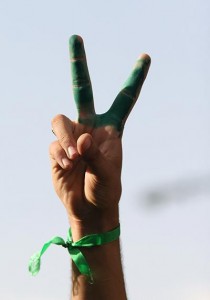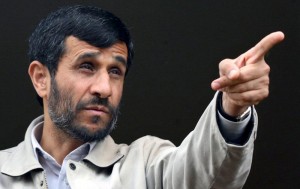
2125 GMT: We Persist. The Committee of Human Rights Reporters, many of whose members have been detaineed,
has issued a statement:
The Committee of Human Rights Reporters once again by maintaining the path that it has taken and by supporting other human rights organizations, emphasizes that it will continue its decisive activities in reporting human rights conditions on both national and international levels through collaborations with independent and credible international human rights organizations.NEW Iran Labour Front: Minimum Wage, “Unprecedent Poverty and Hunger”, and Strikes
NEW Iran Analysis: What Does the Fire Festival Mean?
NEW Latest Iran Video: Two Views of the Fire Festival (16 March)
Iran Document: Mousavi Speech on “Patience and Resistance” (15 March)
Latest Iran Video: The Attack on Karroubi’s House (14 March)
Iran Breaking: Ban on Reformist Political Party
The Latest from Iran (16 March): Fire and Politics
2115 GMT: Karroubi's Big Line. Here's
the stinger statement from Mehdi Karroubi as he addressed the (banned) Islamic Iran Participation Front: "Why is it that the justifications of the Shah for his actions were wrong but the very logic and content of his words coming from you is to be considered right?"
1945 GMT: Political Prisoner News. Documentary maker Mohammad Rasoulof, who was arrested in the raid on director Jafar Panahi's house
, has been released. Panahi is the only person from the incident who remains in detention.
1915 GMT: Picture of the Day. Mohsen Mirdamadi, the head of the Islamic Iran Participation Front, on his release from detention:

1910 GMT: Economy Watch. Iran
has cut the cheap petrol ration by 25% to 60 litres per vehicle per month from 21 March. Currently, each vehicle is allowed a quota of 80 litres of fuel at 10 cents a litre, with any amount needed on top of that priced at 40 cents.
Now is the move part of President Ahmadinejad's subsidies reduction plan or a response to tightening fuel supplies with the prospect of reduced imports? Or both?
1900 GMT: Labour News. We've posted
an interview with Jafar Azim Zadeh, the head of the Free Assembly of Iranian Workers, about the minimum wage, inflation, and the prospect of "poverty and hunger" for Iran's labourers.
1745 GMT: Reformist Relay. Once again, prominent opposition figures are putting out a series of statements. There is
Mir Hossein Mousavi's speech to the Islamic Iran Participation Front, Mehdi Karroubi's "Let Us Rally" statement (see 1600 GMT), and
Mohammad Khatami's address to members of the Islamic associations of Tehran universities.
Khatami insisted that the government "does not have the right to defy the constitution" and declare that its opponents are "adversaries of the regime". He asked the Iranian judiciary, "How is it that baseless accusations against some people are pursued fiercely by the judiciary whilst deviant groups are free to insult and slander any Shiite leader they might dislike?"
Khatami emphasized that the establishment can resolve problems by releasing political prisoners and upholding liberties that are the people's legal right.
1600 GMT: Karroubi Watch. The Facebook site that supports Mir Hossein Mousavi is carrying
a statement from Mehdi Karroubi, "Let Us Hold a Rally".
1345 GMT: Rafsanjani Watch. The reformist
Parleman News declares "One Step Forward" for former President Hashemi Rafsanjani in his political manoeuvres.
1245 GMT: I'm Not Sure You Get It, Dude. At a news conference, Minister of Oil Masoud Mir Kazemi has warned that
Tehran will blacklist companies which stop their gasoline exports to the country.
With respect, Mr Kazemi, I think the point here is not that you might blacklist them but that they are blacklisting you (since Iran imports 40 percent of its consumption of gasoline). As Khabar Online, which carries the report, notes, "It's not clear how Iranian government is to punish the companies which cut off gasoline delivery to the country."
1235 GMT: Another Death Sentence. Amidst chatter, some of it from the regime, about capital punishments, the International Committee for Human Rights in Iran claims a confirmed case. Abdolreza Ghanbari, accused of "mohareb" (war against God) for participation in Ashura protests,
has been sentenced to death.
1230 GMT: We Will Not Be Silent (2). The wife of Mostafa Tajzadeh. former Deputy Minister of Interior and senior member of the Islamic Iran Participation Front, has declared that he "
will talk to the people on a convenient occasion". Tajzadeh was released without bail for the Iranian New Year.
1210 GMT: We Will Not Be Silent (1). The Mojahedin of Islamic Revolution party
has issued a statement: Ahmadinejad has erased freedom and taken the bread from people's tables.
1205 GMT: Etemaad To Re-Open (at a Cost)?
Aftab News is reporting that
the ban on Etemaad will be lifted after payment of a "bail" (we are confirming whether 100 billion or 100 million toman, which corresponds to either $100 million or $100,000), with the newspaper reappearing in the Iranian New Year.
1025 GMT: Happy New Year, "Rioters". Under the heading of not-very-surprising news,
Press TV reports:
Sentences have been handed down to 86 detainees of Tehran's Western-led post-election unrests on charges that include taking part in illegal riots and disrupting public order....
According to the statement, the sentences were issued for charges such as "conspiring against national security, spreading propaganda against the establishment, membership in hostile and anti-Revolutionary groups, taking part in illegal gatherings, and disrupting public order."
0848 GMT: Rafsanjani Watch.
A poor attempt at analysis, simplifying a complex politician, in
Foreign Policy. The magazine headlines a piece by Genevieve Abdo, a front-line writer on Iranian politics, "Iran's most independent politician finally casts his lot with the hard-liners."
There's a huge difference between giving support to the Supreme Leader, which Rafsanjani has clearly set out in recent months, and giving support to the Government. Abdo's evidence for the latter consists of this: Rafsanjani and Ahmadinejad were both at a celebration on 4 March of the birthday of the Prophet Muhammad.
Hmm.... Might want to set this against the steady sniping at the Government from Rafsanjani allies like Hassan Rohani. And it might be useful to speak with someone in the opposition before telling readers:
The green movement is taking Rafsanjani's return to the fold as a setback. With his independent voice now subsumed into the hard-line camp, there is no doubt this development will lead him to curtail his recent criticism of Ahmadinejad and Khamenei.
(Normally I wouldn't put such a poor analysis in the updates. But Foreign Policy is a front-line website for the Washington networks, so assertions like these can be read by US officials and journalists as the "hot intelligence" on Iran.)
0844 GMT: Mousavi's New Year. Mir Hossein Mousavi has already set down a marker for "a year of patience and steadfastness" in his speech to the Islamic Iran Participation Front. Now he and his wife, Zahra Rahnavard, announce they are
putting out a video message, addressed to the people of Iran, for the Nowruz (the Iranian New Year).
0840 GMT: Political Prisoner Watch. An activist reports that Saeed Nourmohammadi, a leading member of the Islamic Iran Participation Front,
has been released on bail.
0830 GMT: We begin this morning with a look at last night's Chahrshanbeh Suri (Fire Festival) celebrations. There are
two videos with different visions of the evening, and we have
an analysis: "Sometimes a celebration should be considered first as a celebration....Sometimes a celebration should then be considered political."
 Tuesday, March 30, 2010 at 6:46
Tuesday, March 30, 2010 at 6:46  Josh Shahryar writes for EA:
Josh Shahryar writes for EA:




